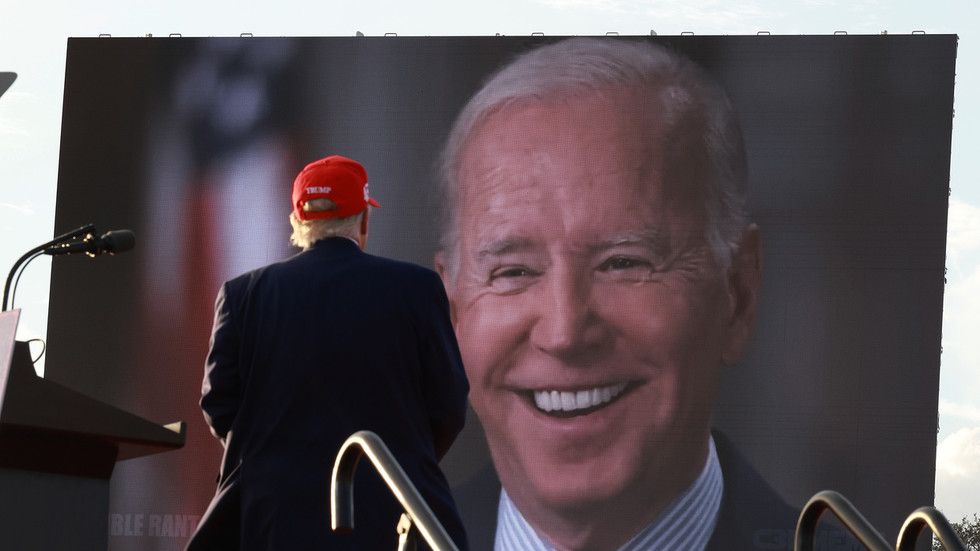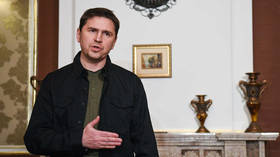
Change we can’t believe in: A Russian view on next year’s US election
By Andrey Kortunov, Ph.D. in History, Director General of the Russian International Affairs Council, RIAC member

Former US President Donald Trump watches a video of President Joe Biden playing during a rally on November 6, 2022 in Miami, Florida © Getty Images / Getty Images
“All the world’s a stage,” proclaimed the hero of a Shakespearean comedy. If we follow this metaphor, presidential elections in America are always a multi-act drama, often turning into a melodrama with elements of tragicomedy and even farce. Major and minor characters perform on the political stage, sudden plot twists are punctuated by various special effects, and culminate in a colorful extravaganza in November of each leap year.
The audience watching the play from inside the theater can only follow the actors’ performances, trying to keep up with the rapid unfolding of the plot’s intricacies, and wonder how the show will end. But unlike the conclusion of a Shakespearean comedy, much depends on the outcome of the US election. So, even if the opening of the show doesn’t herald a stunning display of stagecraft, the world’s attention will be focused on the American political scene in one way or another.
Two categories clearly stand out among audiences of this theater. The first can be conventionally described as political romantics. This group does not demand a reading from the actor, but a complete death in earnest. The romantics always talk about the “historic choice,” about the critical “bifurcation point” in the development of the US, and about the “fateful” significance of this electoral cycle both for America and for the rest of humanity.
Another category are the conventional skeptics. They assume that, for all its splendor and even pomp, the process will make little difference to the lives of Americans, let alone to all the other inhabitants of our planet. Mark Twain, who clearly belonged to the skeptical camp, is credited with perhaps the most emphatic credo of the latter: “If voting made any difference they wouldn’t let us do it.”

Read more
These two categories are certainly present in Russia. Our romantics always hope that a change of team in the White House will open up new opportunities in relations between our two countries. Today, they assume that there can be no one worse for Russia than the incumbent US president. They remind us that, since Richard Nixon, it has always been easier for Moscow to deal with pragmatic Republicans than with ideological Democrats. They also pay tribute to Donald Trump, generously quoting his recent reassuring statements about Russia.
Skeptics, for their part, stress that American foreign policy has always been bipartisan and that there is a strong negative consensus against Russia in the American political establishment. They also often bring up Trump, but only as a clear illustration of the fact that even a US president who is generally favorable to Moscow is inevitably powerless in the face of the all-powerful ‘deep state’.
Probably both romantics and skeptics have their own truth. But if the skeptics are right in general, the romantics may be sometimes correct. Indeed, there is now a broad and enduring anti-Russian consensus in the US – broader and more enduring than even a similar anti-China consensus. The White House and Congress, the Pentagon and the State Department, the leading media and influential think tanks generally have, if not unified, then very close positions on Moscow, and these positions are unlikely to change even in the medium term.
Nevertheless, any new team in Washington has to distinguish itself from the old one and prove its undeniable superiority over its predecessors. This means new nuances in foreign policy. For example, the Republicans will not abandon military support for Kiev, but they will have to take into account that foreign aid programs have never been popular with voters, especially conservative ones.

Read more
It is therefore reasonable to expect that the Republicans will seek to tighten control over how US military and other aid to Ukraine is spent. We can also expect them to push for a “fairer” distribution of the burden of military support for Ukraine between Washington and its European allies.
Moreover, US approaches to Russia should be seen in the broader context of US foreign policy. For example, Democrats have traditionally been much more concerned than their Republican opponents about promoting liberal values around the world. This fixation wins Joe Biden points in predominantly liberal Europe, but creates problems with such important “illiberal” or “not quite liberal” US partners like Turkey, Saudi Arabia, Vietnam, or even India.
A Republican victory would be enthusiastically welcomed in these countries, but would pose a serious challenge to fragile transatlantic unity. These differences, though not radical, need to be taken into account by all international actors, including Russia.
As always, the Republican elephant in opposition today demands change, while the Democratic donkey in power wants things to hold firm. A victory for Biden in next November’s election would mean another four years of the status quo, unless the aging president is forced to leave office before January 2029. A victory for any Republican candidate would trigger a process of revision of policy, creating both new opportunities and new challenges for America and the rest of the world.




